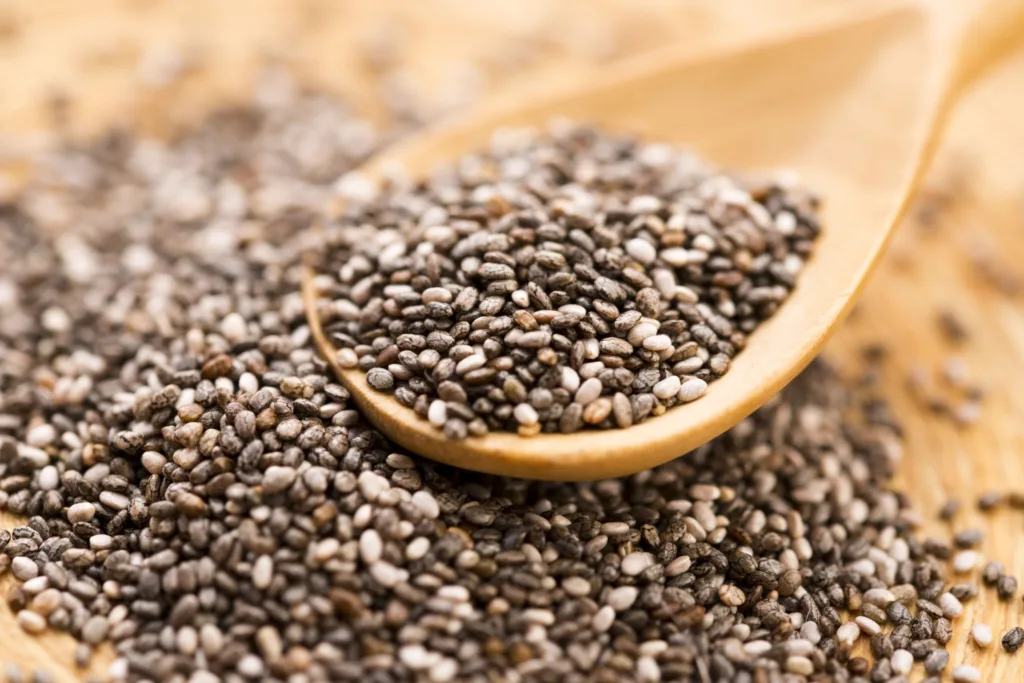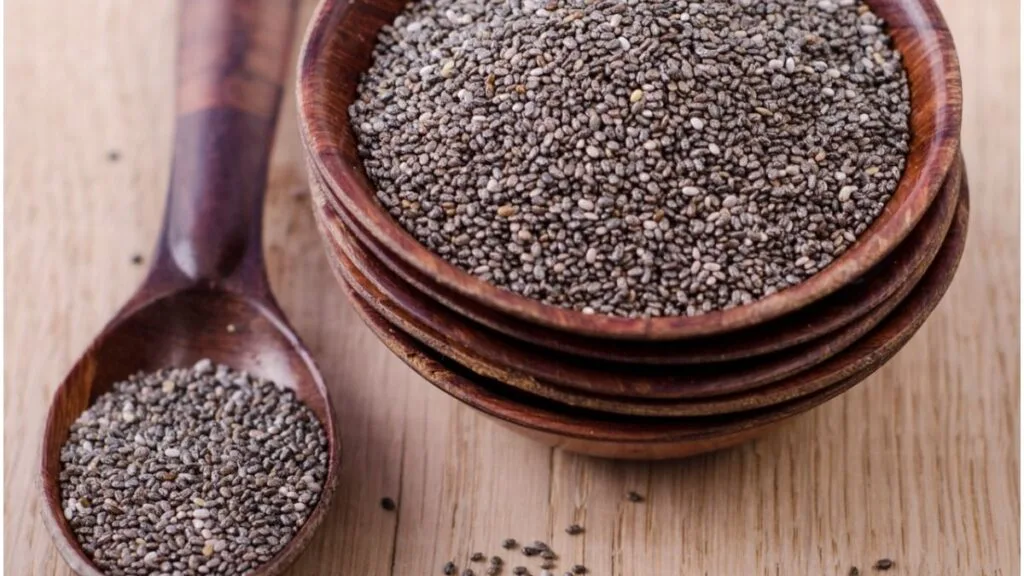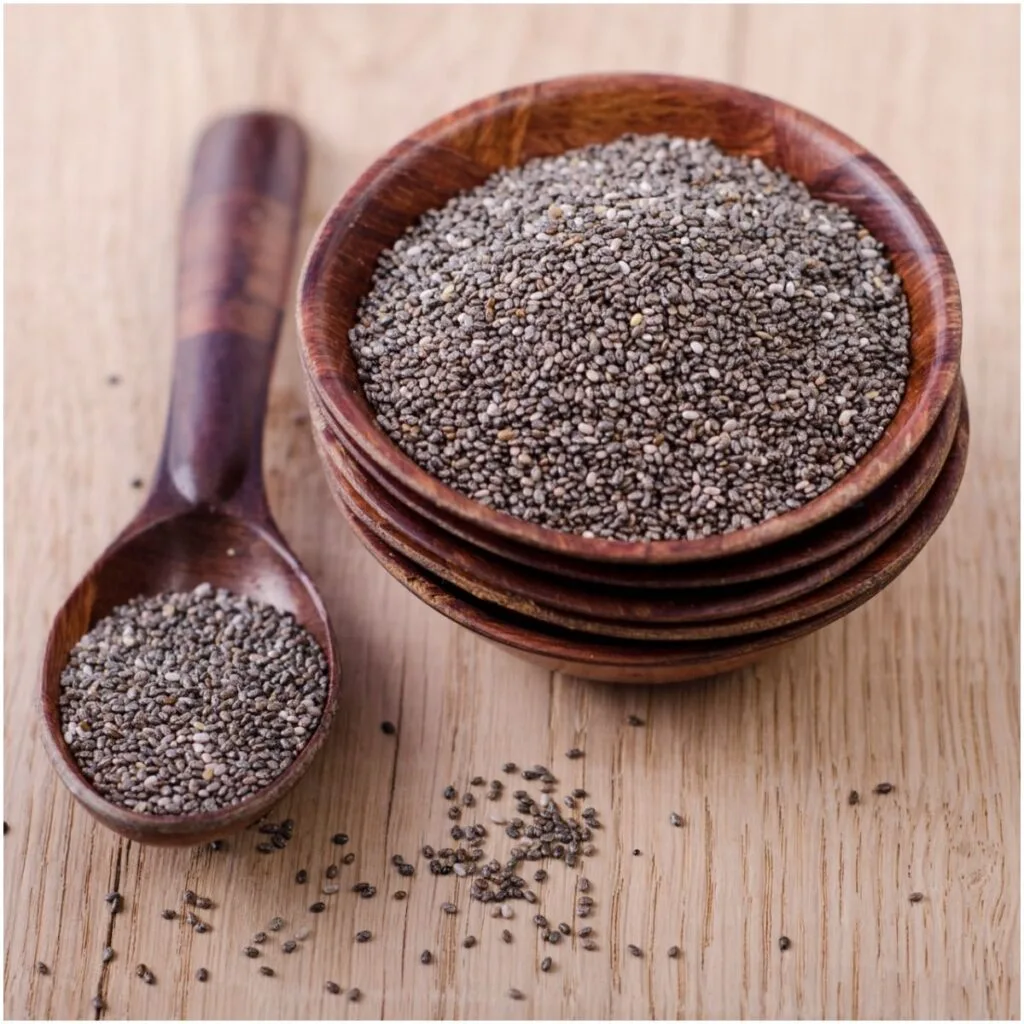Chia seeds have become an increasingly popular health food in recent years. These tiny, oval superfoods boast an impressive nutritional profile. They are loaded with fiber, protein, omega-3 fatty acids, and various micronutrients. With the combination of all these beneficial components, it’s no wonder chia seeds are often marketed as a weight loss aid. But is there any truth behind the claims that chia seeds can help shed unwanted pounds? Let’s explore the scientific evidence behind the connection between these ancient seeds and weight management.
A Nutritional Weight Loss Powerhouse
The nutritional composition of chia seeds makes them a standout among superfoods. Just a 1-ounce (28 grams) serving contains 11 grams of dietary fiber, 4 grams of protein, 9 grams of fat (5 grams are omega-3s), and minerals like calcium, manganese, and magnesium (1). This nutrient density provides a trifecta of benefits for weight loss: appetite regulation, blood sugar control, and a metabolism boost.
The high fiber content is key for appetite control. Soluble fiber forms a gel-like substance when mixed with fluid in the stomach. This slows digestion, allowing nutrients to be absorbed gradually. Studies show increased feelings of fullness and reduced hunger when consuming viscous fibers like those in chia seeds (2). The protein content also regulates appetite by stabilizing blood sugar and decreasing levels of the hunger hormone ghrelin (3).
In a 2015 study, subjects who consumed chia seeds at breakfast reported feeling 40% less hungry and had 43% lower blood sugar spikes after eating compared to the control group (4). Additional studies also found chia seeds’ ability to reduce appetite kept participants feeling fuller for longer (5, 6).

Keeping Blood Sugar in Check
Controlling blood sugar levels is essential for weight loss and metabolic health. The fiber and protein in chia seeds help slow the digestion and absorption of carbohydrates. This leads to a gradual, steady rise in blood sugar instead of rapid spikes.
Chia’s ability to regulate glucose levels has been demonstrated in several studies. A 2017 study gave participants bread containing different amounts of chia seeds. The higher the chia content, the lower the subsequent rise in blood sugar (7). Another study found consuming chia seeds for 12 weeks decreased fasting blood sugar levels by 6.3% (8).
Maintaining stable blood sugar paves the way for weight loss. When blood sugar rises rapidly, the pancreas secretes insulin to lower glucose levels. Excess insulin can decrease fat burning and increase fat storage (9). The gradual release of carbohydrates from chia seeds helps avoid this rebound effect.
Revving Up Your Metabolism
The omega-3 fatty acids in chia seeds may also assist with weight loss by boosting metabolism. Alpha-linolenic acid (ALA), the plant-based omega-3 found in chia seeds, has been linked to increased energy expenditure after eating (10).
In a small study, consuming 25 grams of chia seeds increased resting metabolism by 9.4% compared to baseline (11). The researchers attributed this thermogenic effect to ALA’s influence on fat oxidation rates. Although more extensive clinical trials are needed, this provides preliminary evidence of chia’s potential to rev up your metabolism.

Stopping Cravings in Their Tracks
Intense food cravings can sabotage anyone’s weight loss efforts. The high nutritional value of chia seeds helps provide satiety between meals, keeping cravings at bay.
In a 2018 study, participants who ate chia seed pudding as an afternoon snack reported improved satiety scores and a 28% reduction in food cravings compared to the control snack (12). Not only are chia seeds nutritious themselves, but they can be incorporated into balanced snacks and meals that make cravings less likely to arise.
Sustained Energy Without the Crash
Instead of providing a quick burst of energy from refined sugars, chia seeds offer a prolonged source of fuel. Their high fiber content causes a slow release of carbohydrates into the bloodstream.
Athletes have utilized chia seeds to maintain energy and endurance during exercise. In a 2010 study, athletes consumed chia seed gel before a 90-minute endurance test. Their performance levels were significantly higher compared to the placebo, likely due to chia’s gradual energy release (13).
This steady supply of energy can prevent the energy lulls and fatigue that can derail weight loss motivation. The sustained energy from chia seeds provides an advantage over the quick but fleeting rush of sugary energy sources.
The Bottom Line from Scientific Research
Numerous studies have examined chia seeds’ effectiveness for weight loss with mixed results. A systematic review of 15 studies concluded that chia seed consumption has the potential to reduce body weight, waist circumference, and body mass index. However, the authors note the evidence is still inconclusive (14).
Some trials reveal more modest benefits. In an 8-week study, chia seed intake decreased body weight compared to placebo but did not significantly reduce waist circumference or body fat percentage (15). Another 12-week study found similar results, with chia seeds lowering body weight but not impacting body composition (16).
While research results are varied, the fiber, protein, and omega-3 content of chia seeds appears to impart several small benefits that could complement a weight loss regimen. Larger and longer-term studies are needed to clarify optimal serving sizes and the magnitude of chia’s effects.

Integrating Chia Seeds into Your Diet
To harness the weight loss potential of chia seeds, integrate them into your diet gradually. Chia seeds expand in fluid, so start with smaller servings like 1-2 tablespoons (10-20 grams) daily. You can sprinkle them onto yogurt, cereal, salads or smoothies.
Some simple ideas for meals and snacks featuring chia seeds include:
- Chia seed pudding: Combine chia seeds, milk and your choice of fruits and spices. Let sit overnight in the fridge to achieve a tapioca-like texture.
- Overnight oats with chia seeds: Mix oats, chia seeds, milk and toppings like fruit, cinnamon or nut butter. Refrigerate overnight for a grab-and-go breakfast.
- Chia smoothies: Blend chia seeds with frozen fruit, yogurt, milk and greens for a nutritious weight loss smoothie.
- Chia energy bites: Mix chia seeds into no-bake energy bites along with oats, nut butter and honey or maple syrup.
Avoid going overboard on chia seed serving sizes, which can pile up calories. Measure portions to keep intake moderate as part of a balanced diet for weight loss.
Potential Precautions to Keep in Mind
While generally well-tolerated, chia seeds do come with some cautions. As with any new food, be mindful of allergies or digestive discomfort when introducing chia seeds. Due to their ability to absorb liquid, drinking plenty of water is important to avoid gastrointestinal side effects.
Those on blood thinners or blood pressure medications should exercise caution, as chia seeds’ omega-3 content could increase the risk of bleeding or impact drug effectiveness. Check with a doctor first if you take any medications or have a medical condition. Introduce dietary changes gradually while monitoring how you feel.

The Takeaway: A Useful Addition, Not a Magic Bullet
Science has uncovered several ways chia seeds may complement weight loss efforts through appetite control, blood sugar regulation, and metabolism support. However, proof for significant weight loss specifically is limited and mixed. While chia seeds are very nutritious, they are just one piece of the weight management puzzle.
A sustainable, healthy diet and active lifestyle are the foundations for long-term weight loss success. But incorporating fiber- and protein-rich chia seeds can provide helpful benefits. More research is warranted to expand our knowledge and better apply chia’s potential to real-world weight loss strategies.
In the meantime, try adding chia seeds to your routine in measured portions. Observe any benefits you experience personally, and allow chia to be one tool among many on your journey toward your health goals.
Conclusion
In conclusion, the question of whether chia seeds can truly turbocharge your weight loss journey is both complex and intriguing. While chia seeds are packed with nutrients like fiber, protein, and omega-3 fatty acids, they are not a magic bullet for weight loss. However, when incorporated into a balanced diet and combined with regular exercise, they can certainly be a valuable asset.
The high fiber content in chia seeds can help you feel full longer, reducing the likelihood of overeating. Their protein content can aid in muscle repair and growth, which is beneficial if you’re incorporating exercise into your weight loss plan. Omega-3 fatty acids are known for their anti-inflammatory properties, which can help combat the inflammation often associated with obesity and weight gain.
It’s crucial to remember that chia seeds are a supplement to a well-rounded weight loss strategy, not a replacement for a balanced diet and regular physical activity. Over-reliance on any single food item for weight loss is not advisable. Instead, consider chia seeds as a small but powerful component of a larger, more comprehensive approach to losing weight.
Experts generally agree that while chia seeds can be a healthy addition to your diet, they should be introduced in moderation. They are calorie-dense, so excessive consumption can lead to caloric surplus, negating their weight loss benefits.
So, can chia seeds truly turbocharge your weight loss? The answer is that they can contribute to a healthier lifestyle, which is a cornerstone of effective, long-term weight loss. However, they should not be viewed as a quick fix but rather as a supplement to a balanced diet and regular exercise regimen. By understanding their benefits and limitations, you can make an informed decision on how to incorporate chia seeds into your weight loss journey.
Thank you for reading this post, don't forget to subscribe to our free newsletter
!